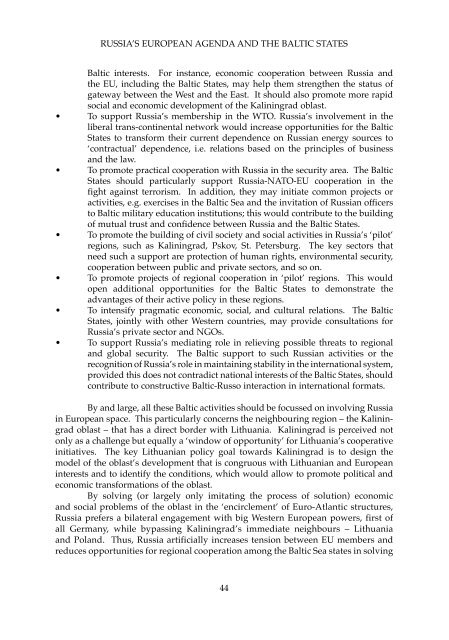Russia's European Agenda and The Baltic States - Defence ...
Russia's European Agenda and The Baltic States - Defence ...
Russia's European Agenda and The Baltic States - Defence ...
You also want an ePaper? Increase the reach of your titles
YUMPU automatically turns print PDFs into web optimized ePapers that Google loves.
RUSSIA’S EUROPEAN AGENDA AND THE BALTIC STATES<br />
<strong>Baltic</strong> interests. For instance, economic cooperation between Russia <strong>and</strong><br />
the EU, including the <strong>Baltic</strong> <strong>States</strong>, may help them strengthen the status of<br />
gateway between the West <strong>and</strong> the East. It should also promote more rapid<br />
social <strong>and</strong> economic development of the Kaliningrad oblast.<br />
• To support Russia’s membership in the WTO. Russia’s involvement in the<br />
liberal trans-continental network would increase opportunities for the <strong>Baltic</strong><br />
<strong>States</strong> to transform their current dependence on Russian energy sources to<br />
‘contractual’ dependence, i.e. relations based on the principles of business<br />
<strong>and</strong> the law.<br />
• To promote practical cooperation with Russia in the security area. <strong>The</strong> <strong>Baltic</strong><br />
<strong>States</strong> should particularly support Russia-NATO-EU cooperation in the<br />
fight against terrorism. In addition, they may initiate common projects or<br />
activities, e.g. exercises in the <strong>Baltic</strong> Sea <strong>and</strong> the invitation of Russian officers<br />
to <strong>Baltic</strong> military education institutions; this would contribute to the building<br />
of mutual trust <strong>and</strong> confidence between Russia <strong>and</strong> the <strong>Baltic</strong> <strong>States</strong>.<br />
• To promote the building of civil society <strong>and</strong> social activities in Russia’s ‘pilot’<br />
regions, such as Kaliningrad, Pskov, St. Petersburg. <strong>The</strong> key sectors that<br />
need such a support are protection of human rights, environmental security,<br />
cooperation between public <strong>and</strong> private sectors, <strong>and</strong> so on.<br />
• To promote projects of regional cooperation in ‘pilot’ regions. This would<br />
open additional opportunities for the <strong>Baltic</strong> <strong>States</strong> to demonstrate the<br />
advantages of their active policy in these regions.<br />
• To intensify pragmatic economic, social, <strong>and</strong> cultural relations. <strong>The</strong> <strong>Baltic</strong><br />
<strong>States</strong>, jointly with other Western countries, may provide consultations for<br />
Russia’s private sector <strong>and</strong> NGOs.<br />
• To support Russia’s mediating role in relieving possible threats to regional<br />
<strong>and</strong> global security. <strong>The</strong> <strong>Baltic</strong> support to such Russian activities or the<br />
recognition of Russia’s role in maintaining stability in the international system,<br />
provided this does not contradict national interests of the <strong>Baltic</strong> <strong>States</strong>, should<br />
contribute to constructive <strong>Baltic</strong>-Russo interaction in international formats.<br />
By <strong>and</strong> large, all these <strong>Baltic</strong> activities should be focussed on involving Russia<br />
in <strong>European</strong> space. This particularly concerns the neighbouring region – the Kaliningrad<br />
oblast – that has a direct border with Lithuania. Kaliningrad is perceived not<br />
only as a challenge but equally a ‘window of opportunity’ for Lithuania’s cooperative<br />
initiatives. <strong>The</strong> key Lithuanian policy goal towards Kaliningrad is to design the<br />
model of the oblast’s development that is congruous with Lithuanian <strong>and</strong> <strong>European</strong><br />
interests <strong>and</strong> to identify the conditions, which would allow to promote political <strong>and</strong><br />
economic transformations of the oblast.<br />
By solving (or largely only imitating the process of solution) economic<br />
<strong>and</strong> social problems of the oblast in the ‘encirclement’ of Euro-Atlantic structures,<br />
Russia prefers a bilateral engagement with big Western <strong>European</strong> powers, first of<br />
all Germany, while bypassing Kaliningrad’s immediate neighbours – Lithuania<br />
<strong>and</strong> Pol<strong>and</strong>. Thus, Russia artificially increases tension between EU members <strong>and</strong><br />
reduces opportunities for regional cooperation among the <strong>Baltic</strong> Sea states in solving<br />
44

















